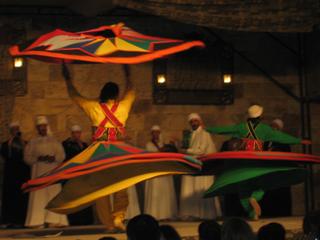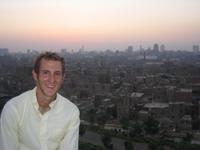Peanut Butter Benefits
Two days ago I ordered it, and today I received it—the much anticipated Sudanese Peanut Butter. Its been a long month without one of my dietary staples, and so my ears naturally perked up when in conversation with a couple of my Mennonite friends, Heidi casually mentioned how their office buys homemade peanut butter from a Sudanese woman and refugee here in Cairo. As there are so few times in life when one’s passions so pragmatically intersect—the first being my desire to aid the Sudanese here in Egypt, and the second being peanut butter, I put in my order. And so while pb&j are back in my diet, so also is a Sudanese family finding the money for their share of the monthly rent in a small one bedroom apartment housing as many as 10 persons.
This first month of ‘orientation’ here in Egypt has two simply put goals for us newcomers: 1) learn Arabic and 2) build immunity to the new strains of E. coli encountered on the streets of Cairo. So, between studying, eating, and sleeping, I’ve been able to choose much of my schedule here this month, which has been a real joy as I’ve been able to simply sit or walk and talk with many I’ve met in these first couple of weeks. And most of those have been from St. Andrews Community Church—a Presbyterian church in the heart of Cairo known for its extensive ‘refugee ministry’ programs. For Cairo has become, along with South Africa’s Cape Town, Africa’s port of exit to the west for those fleeing the injustices of this much exploited and often forgotten continent. And so while there are Africans from seemingly almost every country here, it is the Sudanese that are by far the largest contingent in Cairo, as the underreported and grossly ignored conflict continues in Darfur to this day, as well as the continues expansion of poverty in the south. And so I have had the opportunity to listen in the last couple weeks after several church services, over a couple meals, and on the streets of Cairo. It is beyond the scope of this entry to present the entirety of the situation and all its surrounding issues, but it is my hope that throughout the next year I can present a formidable picture of what it means to be a refugee in Cairo. Today I can merely present the background that has caused my path to cross with that of Simplice, Samwell, Samya, Gazifa, John, Marcos, and so many other young men from Africa.
150 years ago in November the Presbyterian Church of the USA (PCUSA) arrived in Egypt—the first protestant presence to establish churches and service projects along the lower Nile. Today it continues to be the largest protestant contingent as an extensive network of churches and NGOs together make up what is known as the Synod of the Nile. It is well known that the Presbyterian’s presence here was the lone catalyst for the development of an NGO sector in Egypt still in its infancy. It is through this network that I have come to Egypt to work for Care With Love, a health initiative funded by the PCUSA. And it is St. Andrew’s twice-a-week English service that I have begun attending, where I have met many of these African travelers.
Though it has not the capacity or the ability to provide for those it attracts, Egypt’s open door policy has drawn as many as 500,000 refugees to the already overpopulated and unable to expand Cairo. It is not difficult to cross the border; it is difficult to get to the border. I have learned through discussions that the journey to Cairo crosses thousands of miles of desert or open water in war torn regions often lacking clean water and food. Thus, though many families do come together, it is often only the young men that are attracted and advised to make the journey. And to get to Cairo is to arrive at the gateway to hope, for it is here that the United Nations High Commissioner for Refugees (UNHCR) holds office, granting asylum in the first world to a limited number of refugees every year—a number growing smaller and smaller every year as increasing fear of terrorism in the West leads to further isolation. And so every morning one can find Sudanese, Sierra Leoneans, Ethiopians, Rwandans, and many more lining up at the office of the UNHCR awaiting their one and only interview to determine their refugee status. For it is a long process in which few obtain their desired asylum: after applying, one must be called for an interview (which is rare), obtain the coveted blue refugee card (even more rare), and then again wait for as long as years for the official re-settlement. And so it is a long, long waiting game. In the meantime they find themselves like me, in a foreign country with a foreign language and foreign customs. But unlike me, they have no network of support including basic humanitarian services or monetary savings. There is no legal work, no subsidized health care, no public education for foreigners in Egypt. And here is where places like St. Andrews step in. Rooted in the commonality of Christian fellowship, the Protestant and Catholic churches here in Egypt provide places of worship, and in addition ministries of health and education for these people who are utterly ‘between.’ John and Marcos teach English to Sudanese children who pay a minimal fee for books; Simplice comes for the community and perhaps some help in Arabic, for he speaks French and English and cannot find any work without Arabic; Gazafi is enrolled now in the third level of English—in two years he has achieved an ‘advanced’ level and is hoping it will be good enough for his next interview with the UNHCR; Samwell is now taking classes at the seminary in hopes of becoming an ordained minister. The Church is truly a light in a dark world for many here in Egypt—amidst rampant racism, abysmal working conditions, and widespread poverty, the Church is comforting and providing. And so many come.
Unfortunately the school at St. Andrews is beyond capacity and its waiting list is pages long. The free clinic at All Saints is only once a week as the physicians have a tight schedule. There is much to be done, and every little bit counts--the peanut butter is now purchased at a quota every month by the Mennonite office, in order that someone can count on some semblance of a stable income. And as Sudanese peanuts are renowned in this region for their richness of flavor, its really quite good:>


